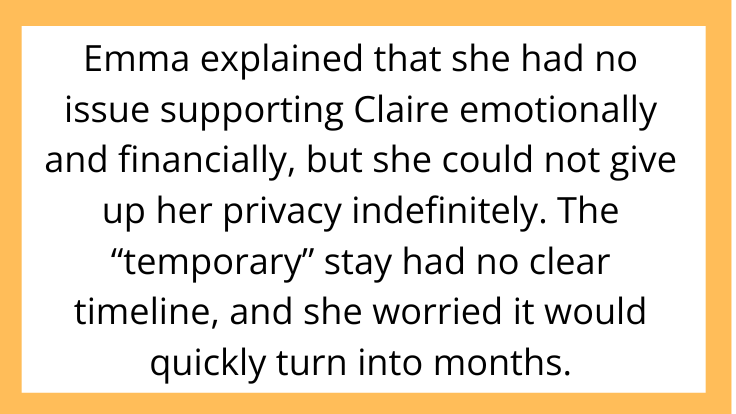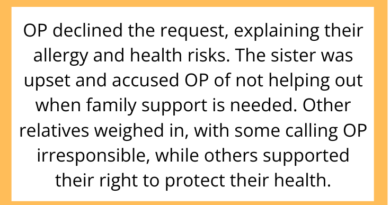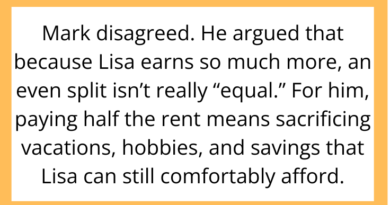AITAH for Not Letting My Best Friend Move Into My Apartment After Her Divorce?
When lifelong friendships collide with personal boundaries, things can get messy fast. In this AITAH scenario, a 28-year-old woman finds herself torn between helping her best friend in crisis and protecting her own peace of mind—and the internet is sharply divided over whether she’s the villain.
Let’s explore the situation in depth.
The Backstory: A Sudden Divorce and a Desperate Request

The original poster (let’s call her Emma) shared that her best friend, Claire, recently went through a sudden and traumatic divorce. Claire had been married for six years. When her husband left abruptly, she had nowhere to go. In a panic, she asked Emma if she could stay in her two-bedroom apartment “just until she got back on her feet.”
Emma has lived alone for three years and treasures her space. She described herself as an introvert who struggles with anxiety and needs her home to be a calm, private sanctuary. Even so, she offered to help Claire find a short-term rental and loan her some money to cover the deposit.
But Claire was hurt and furious that Emma wouldn’t open her home.
The Fallout: Friendship on the Brink

Claire accused Emma of being selfish and ungrateful. She reminded Emma of all the times she had been there for her over the years, including hosting her after a breakup and supporting her through job loss. To Claire, this was the ultimate betrayal—proof that Emma cared more about her furniture and routine than about their bond.
Emma explained that she had no issue supporting Claire emotionally and financially, but she could not give up her privacy indefinitely. The “temporary” stay had no clear timeline, and she worried it would quickly turn into months.
Still, Emma started to feel guilty. Was she heartless for saying no when her best friend was in crisis?
What the Internet Thinks: Are Boundaries Selfish?

The AITAH community responded with thousands of comments, most siding with Emma. Many people emphasized that having boundaries doesn’t make you unkind—it makes you human.
Top reasons Emma was not the villain:
-
Clear boundaries protect relationships. Moving in could strain the friendship even further.
-
Emotional readiness matters. Emma was upfront about her anxiety and need for space.
-
Financial help was offered. Emma didn’t abandon Claire—she simply proposed other solutions.
One popular comment read:
“You can care deeply about someone and still not want to live with them. You set a healthy boundary. That’s not selfish—it’s honest.”
However, others felt that Emma should have sacrificed her comfort for a short time. To them, true friendship means stepping up no matter how inconvenient it feels.
Friendship vs. Self-Preservation: The Core Conflict

This scenario highlights an uncomfortable truth: sometimes, doing what’s right for yourself makes other people feel hurt or rejected. That doesn’t automatically mean you’re wrong.
Emma’s decision wasn’t about disloyalty—it was about self-preservation. She knew she wasn’t emotionally equipped to share her space and believed hosting Claire would damage her mental health and possibly their friendship long-term.
Claire’s response shows how crisis can heighten emotions. While her feelings of abandonment are valid, they don’t entitle her to override Emma’s needs.
Can This Friendship Be Saved?

Conflict doesn’t have to mean the end of a relationship. Here are a few ways Emma and Claire could repair the rift:
-
Communicate openly. Emma should explain her decision with compassion, making it clear this wasn’t about not caring.
-
Offer practical support. Helping Claire secure housing or pay for a hotel demonstrates commitment without sacrificing boundaries.
-
Set timelines. If Emma eventually agrees to host Claire, having a clear move-out date and ground rules could prevent resentment.
Ultimately, though, both friends must accept that support comes in many forms—and no one is obligated to provide the exact kind of help someone demands.
The Bigger Lesson: Boundaries Are Acts of Honesty

This AITAH situation resonates because so many of us have been there: wanting to help but knowing our own limits. It’s never easy to disappoint someone you love, especially when they’re in pain. But relationships built on guilt rarely stay healthy.
Emma’s choice to say no doesn’t mean she doesn’t care—it means she understands her capacity. And in the long run, that self-awareness can preserve the friendship rather than destroy it.



